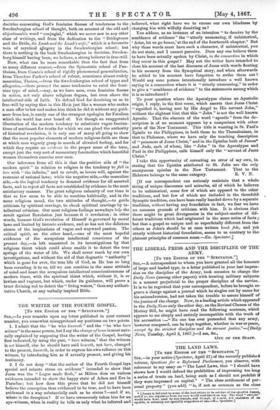1. I admit that the " he who knoweth" and
the " he who bare witness" is the same person, but I say the change of tense is most natu- rally explained by supposing that the writer of the Gospel, having first indicated, by using the past, " bare witness," that the witness is not himself, else he should have said beareth, not bare, changed to the present, knoweth, in order to express his own reliance on this witness, by introducing him as if actually present, and giving his testimony.
2. I do not deny " that the author of the Fourth Gospel lays special and minute stress on evidence" intended to show that Jesus was the " Logos made flesh," as Milton does on various evidences intended to show the happy state of Adam and Eve in Paradise; but how does this prove that he did not himself believe the conception thus evidenced to be true, and to have been evidenced in a way substantially such as he states ?—and if so, where is the deception ? If we have erroneously taken him for an eye-witness, when in reality he tells us only what he inferred and believed, what right have we to excuse our own blindness by charging him with wilfully deceiving us ?
You adduce, as an instance of an intention " to deceive by the semblance of evidence" the " utterly unmeaning, if unhistorical, ' Arise, let us go hence,' at the end of the fourteenth chapter." But why these words must have such a character, if unhistorical, your do not state, and I cannot perceive. Does any one believe them to have been actually spoken by Christ, in the connection in which they occur in this gospel ? May not the writer have intended to close his account of the last discourse of Jesus with words floating in his memory from the Synoptical story, and when afterwards he added to his account have forgotten to strike them out ? Would any sane person intentionally introduce a well known saying in a connection where it is " utterly unmeaning," in order to give a " semblance of evidence " to the statements among which it is so introduced ?
To your question where the Apocalypse claims an Apostolic. origin, I reply, in the first verse, which asserts that Jesus Christ. " signified it, having sent by His Angel to His servant John," without the slightest hint that this " John " is not the well known Apostle. That the absence of the word " apostle " from the de- scription is of no moment appears by a comparison with other parts of the New Testament. This title is wanting in St. Paul's. Epistle to the Philippians, in both those to the Thessalonians, in that to Philemon, where we have only the touching description of " prisoners of Jesus Christ," and in the Epistles both of James* and Jude, each of whom, like " John " in the Apocalypse and: Paul in the Philippians, calls himself only the " servant of Jesus. Christ."
I take this opportunity of correcting an error of my own, in. stating that the Epistles attributed to St. John are the only. anonymous epistles in the New Testament. That to the Hebrews belongs to the same category. E. V. N.
[If our correspondent can seriously maintain that a whole string of unique discourses and miracles, all of which he believes to be unhistorical, some few of which are opposed to the other traditions, and but few of which are included in the threefold' Synoptic tradition, can have been really handed down by a separate tradition, without having any foundation in fact, we fear we have no common grounds of criticism with him. It is obvious that: there might be great divergencies in the subject-matter of dif- ferent traditions which had originated in the same series of facts but that a gospel so unique and so superficially different from the- others as John's should be at once written bond fide, and yet utterly without historical foundation, seems to us contrary to the- plainest principles of common sense.--En. Spectator.]






























 Previous page
Previous page